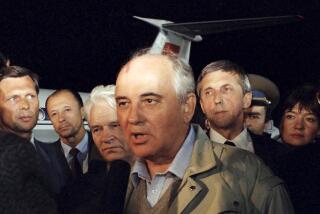Yanayev Viewed as More of a Hard-Line Conservative
- Share via
Over the objections of radical reformers, President Mikhail S. Gorbachev last December personally selected Gennady Ivanovich Yanayev as vice president of the Soviet Union, a position with few well-defined powers except one: The vice president would be temporary successor, if Gorbachev died, resigned or became incapacitated.
The Communist Party apparatchik exercised that authority early today, taking apparent control of the the Soviet leadership after the news agency Tass reported “the inability for health reasons by Mikhail Sergeyevich Gorbachev to perform his duties as U.S.S.R president.”
Gorbachev, 60, was in the second week of a vacation in the Crimea on the Black Sea when Yanayev, a hard-line Communist, signed the decree that Tass said “was circulated here (in Moscow) today.”
Yanayev is considered to be a more conservative Communist Party member than Gorbachev but was seen primarily as a party worker, rather than a central leader. Under the Soviet constitution, he will hold office until a new president is chosen.
At the time of his appointment, Yanayev was viewed by reformers as further proof that Gorbachev was backing away from real reform in the face of severe economic and political turmoil.
Yanayev’s selection was seen as part of an effort by the president to swing the country back toward more traditional socialism, and, in the eyes of some reformers, a possible dictatorship.
“Today, we have buried our democratic structure for good in favor of dictatorial presidential rule,” economist Alexei M. Yemelianov told reporters the day of Yanayev’s nomination.
But in his speech to the Congress of People’s Deputies, Gorbachev called Yanayev an “experienced politician . . . a man of character and conviction, a mature politician . . . a man of firm principles, an active supporter of perestroika and an active participant in it.”
“I want someone alongside me I can trust,” Gorbachev said to the Congress in urging it to elect Yanayev vice president.
Yanayev proudly described himself to the national Parliament as “a Communist to the depths of my heart” but a Gorbachev-style Communist who “was infected with the ideas of 1985” when Gorbachev began his perestroika reform.
Yanayev said he had served those reforms, “does serve them and will continue to serve them.”
Gray-haired, with a bass voice and dark bags under his eyes that make him look older than his 53 years, Yanayev was born in a village in the central Russian province of Gorky in 1937. He was educated as a mechanical engineer, as a lawyer and historian. He graduated from the Gorky Agriculture Institute in 1959, spent several years in the Young Communist League, and, for a number of years, worked in other youth and party organizations.
He is a former chairman of the Central Council of Trade Unions. When Gorbachev nominated him for vice president, he was in charge of foreign affairs in the Politburo.
Yanayev, his wife, Roza, their two daughters, son-in-law and grandson live in a spacious Moscow apartment. He told a Russian interviewer in January that he is fond of hockey--occasionally still playing. He likes reading classical literature.
During his less than one year as head of the trade unions council, Yanayev made dire predictions of mass unemployment and pushed for unions to break their traditional role as obedient servants of government.
He was elected to the Communist Party Politburo in July, 1990, and his nomination as vice president was confirmed by the 2,250-member Congress in a secret ballot Dec. 26. His was the only name on the ballot, but it still took two votes before he was confirmed.
During the nomination process, Gorbachev skirted a deputy’s question about whether he could imagine Yanayev in his seat, saying only that “I see him now in the post of vice president.”
In a January interview for Glasnost, a new weekly publication, Yanayev admitted he had criticized Gorbachev “for his indecisive actions and erroneous decisions. . . . I’m not going to become a pale shadow of the president.”
The takeover by Yanayev came three days after Gorbachev’s former close aide and Politburo member Alexander Yakovlev quit the Communist Party and predicted that desperate hard-liners would attempt a coup to stop Gorbachev’s reforms.
More to Read
Sign up for Essential California
The most important California stories and recommendations in your inbox every morning.
You may occasionally receive promotional content from the Los Angeles Times.









